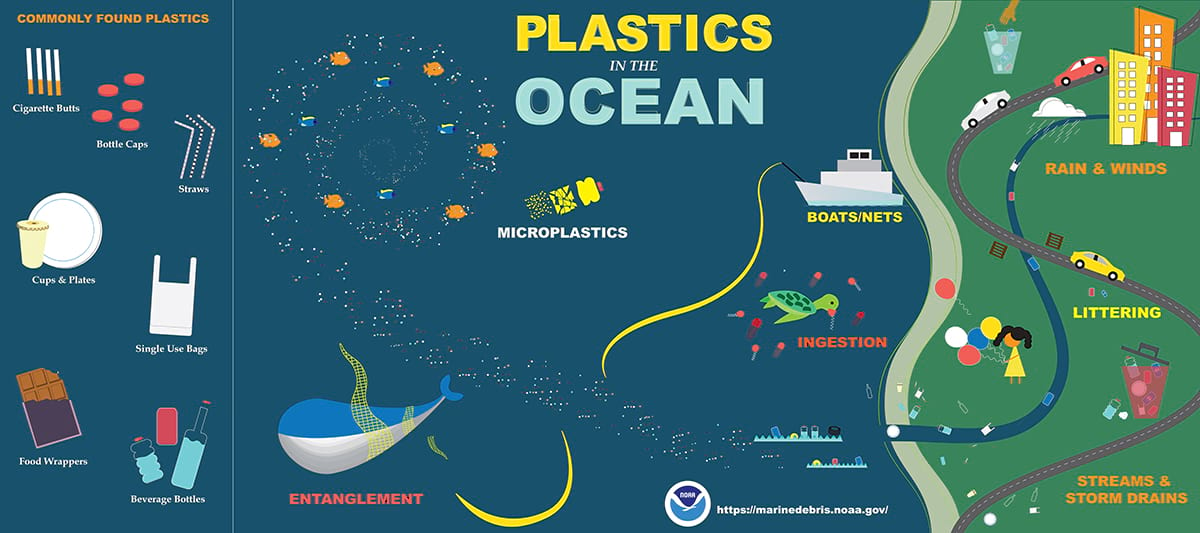Skip the straw!
Many of us are wearing reusable cloth face masks during this pandemic. We wear them to protect ourselves, our families and our communities. And if we gotta wear them, we may as well use them as a shout out to our favorite sports teams, fictional characters, hobbies and schools. Wearing a washable, re-wearable mask is the green thing to do! But many of us also wear disposable masks. And that’s okay, too. We all need to wear a mask, no matter what type we can get our hands on, but … we really need to dispose of them responsibly. The sad fact is, a lot of these masks are not being disposed of properly, which adds to the pollution of our oceans, which are already dreadfully polluted by pre-pandemic trash.
Scott Wilson, writing for The Washington Post last December, explained, “Since the pandemic began early this year, masks have become a go-to item of the national wardrobe, especially here along the California coast, where mask-wearing rates are high. But many are careless with the new accessory, and in windy places like many along this state’s 840-mile coast, the masks and other products are ending up on sidewalks, skittering into storm drains, blowing onto beaches and ending up in the Pacific Ocean and its bays…Many types of masks, including the most common surgical variety, contain plastics that taint ocean ecosystems and disrupt marine food chains. The bottom line is that, in the era of COVID-19, another form of mass-produced human stuff is making its way into places where humans do not live.”
Masks are not the only things clogging our beautiful bays and oceans. The drinking straw is another example of the type of plastics that are polluting our waters and hurting marine life.
The difference between masks and straws is this: we all need to be wearing masks right now, but most able bodied people do not need to drink from a straw. According to the Ocean Conservancy, plastic straws and coffee stirrers are among the worst of the oceans’ plastic pollution. Volunteers for coastal cleanups have picked up almost 14 million straws over more than 30 years, but so many more of these items have made it into the ocean where they hurt sea turtles, sea birds, fish and ocean mammals. That is a lot of straws!
National Skip the Straw Day
The fourth Friday in February has been designated as National Skip The Straw Day to bring attention to this very real threat to our environment and marine life. As with other single use plastics, straws make their way into places they should not be, often ending up in gyres, which are the permanent systems of ocean currents where things, most notably plastic garbage, collect. The National Oceanic and Atmospheric Administration refers to these places as garbage patches, and, unfortunately, there is one right here in our Pacific Ocean!
Two great videos for learning more about the Great Pacific Garbage Patch can be found here and here:
By skipping the straw with our beverages at restaurants and take out establishments, not just this Friday, February 26th, but every day, we can make a dent in the potential additions to these piles of plastics which will make our oceans a healthier place for the creatures who live there. If we need a straw, or just really like using one, we can still do that! National Skip The Straw Day encourages us towards reusable straws made of bamboo, glass or stainless steel. We can also take it old school and use a paper straw, in honor of Marvin Stone, who invented the paper straw in 1888! Who doesn’t love a good Throwback Thursday, or everyday for that matter?!
So we have agreed to skip the straw. That is a great start! What else can we do to prevent more plastics from ending up in the Great Pacific Garbage Patch and harming our wildlife? For one thing, we can patronize businesses that are also committed to skipping the straw. And there are many of them. In 2020 Starbucks abandoned straws completely and moved to sippable cups. If we are eating local, and our favorite place to chow down or take out is still giving out plastic straws, we can encourage them to skip the straw too! The Ocean Conservancy offers this advice: “Ask your local eateries to not automatically serve plastic straws with beverages. Instead, they can serve them upon request. Here’s a letter you can use when approaching restaurants and other businesses.” Great idea! But we are capable of even more than that! We can also sign up to participate in the California Coastal Commission’s programs, such as Coastal Cleanup Day, Adopt-A-Beach®, or the Schoolyard Cleanup Program.
Think you know all you need to know about our oceans and plastic pollution? Don’t be so sure! Take this quiz to see if you might learn a little more than you know already!
#BlackHistoryMonth Spotlight: Vanessa Nakate (Ugandan climate activist)
It’s not just Californians who love our environment and worry about climate change!

Ugandan climate activist Vanessa Nakate has joined teen Greta Thunberg and others as young leaders who are advocating for our planet as we face climate crises all over the world. As detailed in an Oprah magazine article last January, she gained worldwide attention last January when she was cut out of a group photo distributed by the Associated Press of her with several other young white climate activists. After the unexplained slight, she commented, “The cropping made it possible to believe that African climate activists were absent from Davos; that Africans weren’t active in the climate change movement; and that there wasn’t a global youth climate movement that included people like me and many others in Africa, Asia, and Latin America.”

Black voices must be heard. Always. Vanessa Nakate is making her voice heard loud and clear with her new book, A Bigger Picture: My Fight to Bring a New African Voice to the Climate Crisis. Set to be published in November of 2021, her book will undoubtedly be a powerful read on climate change and its effects on the people of African nations and the racial injustices that come with it. In her Oprah magazine interview, the author states, “Right now…people don’t understand the urgency of the climate crisis. In my part of the world and others, people are being left with nothing—no food, no water, no place to live—as a direct result of climate change. And we will never get to zero hunger or achieve gender equality or lift millions from poverty without addressing climate change.” Listed in Time magazine’s 2021 Time100 NEXT list, she is a young Black woman making her mark on the world as a climate change leader and activist who is also working for social justice. We expect to be hearing her powerful voice long into the future and look forward to adding her book to the library’s collection next fall.






Pingback: Women’s History Month and International Women’s Day | The John L. Zoph Library at Junípero Serra High School
Yes, we just bought a set of silicone drinking straws … they even came with a straw brush for cleaning!